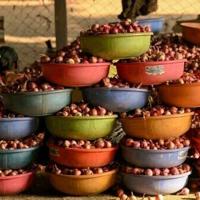Onions are a crucial ingredient in almost every Indian meal, along with sugar and lentils. Politicians often use these essential cooking items to gain favor with voters by reducing costs. However, their strategies to lower prices by imposing export bans on products like onions and sugar, or by permitting duty-free imports of lentils, have angered farmers, a key voting demographic.
Farmers argue that these government decisions result in market floods and that any savings consumers enjoy come at their expense. Kanha Vishnu Gulave, an onion farmer from Nashik district in Maharashtra state, expressed his disappointment with the sudden price crash after an export ban in December.
Prices dropped significantly post-ban, leading to protests in Maharashtra. Bharat Dighole, president of the onion producers’ association in Maharashtra, highlighted the rise in production costs since 2017, which was not reflected in consumer prices.
India’s agricultural sector plays a significant role in its economy, and onion prices often serve as a gauge of government popularity. High onion prices have triggered protests and even led to political shifts in the past.
Although Prime Minister Modi is likely to secure a third term in the ongoing elections, the BJP has faced challenges in state elections due to past issues like high onion prices.
Recent decisions by the Modi government to lift export bans on onions ahead of elections were seen as strategic moves, with analysts claiming that restrictions still hindered exports. Farmers like Akshay Tarle and Vikas Babaji Tushare expressed concerns about selling their produce at fair prices.
Economist Ashok Gulati criticized the government’s policies on onion exports, warning that such measures were hurting farmers. He also pointed out similar issues with lentil imports affecting domestic production.
Despite the challenges, farmers like Jagannath Bhimaji Kute remain hopeful for change and urge the government to prioritize their concerns. Kute emphasized the importance of supporting farmers and questioned why the prices of essential items like fuel and cooking oil were rising while agricultural produce remained cheap.





